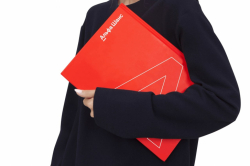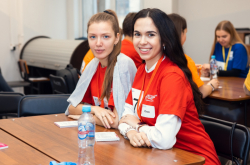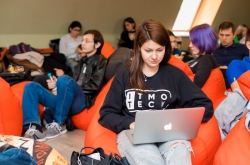Alfa-Chance is a scholarship contest organized by one of Russia’s largest commercial banks, Alfa-Bank, as part of its philanthropic activities. It covers 17 national universities in total, offering its students with a monthly scholarship worth 10,000 rubles for the duration of two academic years. The only condition for the prolongation of the scholarship period is for a candidate to have a consistently good academic record and no failed exams they’d need to make up for.
First-year Bachelor’s students who have graduated from a school in any Russian federal subject except Moscow, pursue their university education on a government scholarship and meet at least one of the following requirements, are eligible to participate in the Alfa-Chance contest:
- winners of the national academic competitions for school students;
- school graduates with a 100 point score in the Unified State Exams;
- school graduates with accomplishments in the field of sport, culture, literature;
- active participants of volunteer and charity projects.
The competition took place in three rounds, shares Varvara Nikiforova, manager at ITMO University’s Student Initiatives Development Office.
“The contest began with an open call for participants and the consequent evaluation of received applications by the selection committee. The students admitted to the second round were asked to write an essay on ‘Education of the Future: What innovations does ITMO University need?’. Their works were assessed by a special committee consisting of three experts. All essays were encoded and anonymized to ensure full impartiality and equal treatment of contestants, who were judged on their abidance of the essay topic, creativity, logic, and observance of the language norms and rules. Fifteen students with the best essays went on to participate in the third and final round, which was a face-to-face interview,” explains Varvara.
Following the results of the interview, three winners were selected from ITMO University: Ivan Timakhovich, Ekaterina Subbotina and Timofey Timofeev. They shared about their competition experience with ITMO.NEWS.
Ivan Timakhovich, Faculty of Technological Management and Innovations

Initially I was convinced that I wouldn’t suit the eligibility criteria: I didn’t win any academic competitions, nor did I score a hundred points at the national exam. But then I did some reading on the Alfa-Bank’s website and discovered that they also accept participants with a strong record in social and extracurricular work, and I did have one thanks to my active participation in the life of my hometown of Biysk. The largest project of mine was managing the media group of the local School No 3. We were known as the best school media group in the Altai Krai and took part in many a national event in this rank.
The hardest part of the competition for me personally was writing the essay. How to make the most innovative university in Russia even more innovative? That indeed was a dilemma. I had to do a lot of research on the topic to find out what kinds of innovations there are, how to use them, and which ones have the most potential in the framework of a university. It took me two days to write it all up, and some more time to shorten my essay to the 600 words required.
What I suggested was to perfect the university’s online learning model by adding a special bot that would guide users through the process and help them create a bespoke educational path to suit their needs. By doing this I wanted to address the often-experienced problem of a lack of motivation. Unlike the conventional classes that take place within the university walls and require actual attendance, online courses don’t have such forms of control, and most students don’t really hit the books before exams start as it is. So the bot will motivate them by sending them reminders to study and help them at that, for example, by offering personalized study materials based on their interests. You launch the bot and it immediately starts sending you links to all kinds of podcasts and Youtube channels based on what you’re doing the course on, as an option.
The interview went very smoothly. I mentioned that I enjoy interviewing people, and one committee member suggested I ask him an interesting question. So I threw him a curveball of, ‘What makes you happy?’ I think the committee liked that.
What makes me happy is studying in St. Petersburg, and the fact that I won this scholarship. One part of the scholarship funding I will put aside, another is to be sent off to charities, and as for the rest I haven’t decided yet. Maybe I’ll use it for enrolling into English language lessons, maybe I’ll go traveling instead: I want to better my understanding of other cultures and boost my English by practicing through immersion.
Ekaterina Subbotina, Faculty of Technological Management and Innovations

Even as a school student, I was actively applying for scholarships and succeeded in winning a couple. I see it as a nice recognition of my studying and putting lots of time and effort into the education process.
I had no problems with writing the essay, and I did it very quickly too, because I’m studying at a program that centers on innovations. I divided the proposed changes into several groups. The first consists of innovations targeting the education process itself: I’d make the philosophy course non-obligatory and introduce a subject on knowledge-sharing into everyone’s curriculum instead. It would allow students to share the information they consider useful to each other. The second group of innovations includes changes in ITMO’s smartphone app that would make our lives as students much easier.
The most forward-thinking suggestion of mine, though, is a programmable quadcopter equipped with a special container for documents. This device would address the problem of all the running around from one university building to another when you only need to sign a couple of documents.
The interview was great. I did a lot of reading on life hacks for such occasions before the big day and to my surprise, they all came in very handy, so I’ll repeat these here: be yourself, don’t pretend to be something you’re not, act naturally. For example, I was asked to name my negative quality that actually is a positive one. I blurted out that I’m not capable of lying, and it is in fact the case.
The most difficult question was who do I see myself as after I finish with university studies. Truth is, I’d like to launch some startups, 10 or 20 to be precise, and in such a way that most of them would continue working without my active participation. I was told that this plan simply wasn’t realistic. Well, we’ll see. I’m not a developer, my only job as innovator is to coordinate projects, devise schedules for the development process, and keep people together, and I believe that this could work out.
It’s possible that I spend some of the scholarship money on professional development, these 20 startups included, but as of now all I want is to save enough money to buy my own apartment.
Timofey Timofeev, Information Technologies and Programming Faculty

I applied for an Alfa-Chance scholarship having scored 100 points in the Unified State Exam in Computer Science. Creating my contest portfolio wasn’t at all complicated; I just listed everything I could remember, from participating in national academic competitions and graduating from art school to competing as part of ITMO University’s rowing team. These weren’t even all of my accomplishments, I only focused on the main ones.
The interview went as well, to the point that the ease I felt in answering questions left me a bit surprised because I hadn’t had that much experience with interviews. But when it came to that I really enjoyed it, especially how interactive the process was. I think that all the support I felt from my friends and family kept me grounded.
The only part I had to really work on was the essay. I’m not used to such humanities things. My innovation idea was to launch a university-wide platform with lectures available for everyone. I envisage ITMO.Lectures as a website where the university professors will upload the lectures they give together with supporting materials they use, and the students will write comments on something they didn’t understand and exchange their opinions on the questions discussed. A possible upgrade to that will be for students to upload lectures themselves, record their grades and make rankings of professors and classes.
I plan on investing the money I won in my education, for example to go to an English-speaking country on vacation and practice my English.




